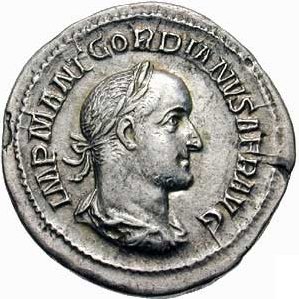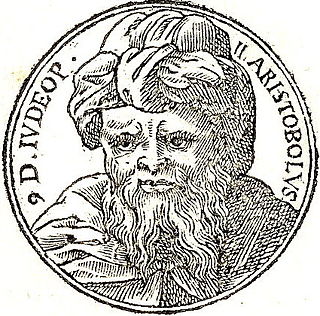
Alexander I Theopator Euergetes, surnamed Balas, was the ruler of the Greek Seleucid kingdom in 150/Summer 152 – August 146 BC. Alexander defeated Demetrius Soter for the crown in 150 BC. Ruling briefly, he lost the crown to Demetrius II Nicator during his defeat at the Battle of Antioch in Syria, dying shortly after.

Severus Alexander was Roman Emperor from 222 to 235 and the last emperor of the Severan dynasty. He succeeded his cousin Elagabalus upon the latter's assassination in 222. His own assassination marked the epoch event for the Crisis of the Third Century—nearly 50 years of civil wars, foreign invasion, and collapse of the monetary economy, though this last part is now disputed.

The Severan dynasty was a Roman imperial dynasty, which ruled the Roman Empire between 193 and 235. The dynasty was founded by the general Septimius Severus, who rose to power as the victor of the Civil War of 193–197.

Year 308 (CCCVIII) was a leap year starting on Thursday of the Julian calendar. At the time, it was known as the Year of the Consulship of Valerius and Valerius. The denomination 308 for this year has been used since the early medieval period, when the Anno Domini calendar era became the prevalent method in Europe for naming years.

Gordian III was Roman Emperor from 238 AD to 244 AD. At the age of 13, he became the youngest sole legal Roman emperor throughout the existence of the united Roman Empire. Gordian was the son of Antonia Gordiana and an unnamed Roman Senator who died before 238. Antonia Gordiana was the daughter of Emperor Gordian I and younger sister of Emperor Gordian II. Very little is known of his early life before his acclamation. Gordian had assumed the name of his maternal grandfather in 238 AD.

Gordian II was Roman Emperor for 21 days with his father Gordian I in 238, the Year of the Six Emperors. Seeking to overthrow Emperor Maximinus Thrax, he died in battle outside Carthage. Since he died before his father, Gordian II had the shortest reign of any Roman Emperor in the whole of the Empire's history, at 21 days.

The Attalid dynasty was a Hellenistic dynasty that ruled the city of Pergamon in Asia Minor after the death of Lysimachus, a general of Alexander the Great.
Tiberius Julius Alexander was an equestrian governor and general in the Roman Empire. Born into a wealthy Jewish family of Alexandria but abandoning or neglecting the Jewish religion, he rose to become procurator of Judea under Claudius. While Prefect of Egypt (66–69), he employed his legions against the Alexandrian Jews in a brutal response to ethnic violence, and was instrumental in the Emperor Vespasian's rise to power. In 70, he participated in the Siege of Jerusalem as Titus' second-in-command.

Aristobulus II was the Jewish High Priest and King of Judea, 66 BC to 63 BC, from the Hasmonean Dynasty.
Bas was the first independent ruler of Bithynia. He ruled for fifty years, from 376 to 326 BC, and died at the age of 71.

Barsine was daughter of a Persian father, Artabazus, satrap of Hellespontine Phrygia and a Greek Rhodian mother, who was the sister of mercenaries Mentor of Rhodes and Memnon of Rhodes. Barsines became the wife of her uncle Mentor, and after his death married her second uncle, Memnon.

St Alexander I of Alexandria, 19th Pope of Alexandria & Patriarch of the See of St. Mark. During his patriarchate, he dealt with a number of issues facing the Church in that day. These included the dating of Easter, the actions of Meletius of Lycopolis, and the issue of greatest substance, Arianism. He was the leader of the opposition to Arianism at the First Council of Nicaea. He also is remembered for being the mentor of the man who would be his successor, Athanasius of Alexandria, who would become one of the leading Church fathers.

Saint Alexander of Jerusalem was a third century bishop who is venerated as a Martyr and Saint by both the Eastern Orthodox Church and the Roman Catholic Church. He died during the persecution of Emperor Decius.

The Ptolemaic Kingdom was a Hellenistic kingdom based in ancient Egypt. It was ruled by the Ptolemaic dynasty, which started with Ptolemy I Soter's accession after the death of Alexander the Great in 323 BC and which ended with the death of Cleopatra and the Roman conquest in 30 BC.

Mithridates II Antiochus Epiphanes Philorhomaeus Philhellen Monocrites, also known as Mithridates II of Commagene, was a man of Armenian and Greek descent who lived in the 1st century BC. He was a prince of Commagene and one of the sons of King Antiochus I Theos of Commagene and Queen Isias Philostorgos of Commagene. When his father died in 38 BC, he succeeded his father and reigned until his death.

Archduke Alexander Leopold of Austria was Palatine of Hungary, appointed during the reign of his father, Holy Roman Emperor Leopold II, and serving into the reign of his elder brother, Holy Roman Emperor Francis II.
The Roman d'Alexandre, from the Old French Li romans d'Alixandre, is a 16,000-verse twelfth-century) Old French Alexander romance detailing various episodes in the life of Alexander the Great. It is considered by many scholars as the most important of the Medieval Alexander romances. Many of the manuscripts of the work are illustrated. The poem is generally divided into four branches. The final form of the poem is largely credited to Alexandre de Bernay who probably placed the branches in the order we find them, reworked the first branch into alexandrines, incorporated the text of Pierre de Saint-Cloud, and added verses to join each branch.
Alexander, or Alexander Maccabeus, was the eldest son of Aristobulus II, king of Judaea. He married his cousin Alexandra Maccabeus, daughter of his uncle, Hyrcanus II. Their grandfather was Alexander Jannaeus, the second eldest son of John Hyrcanus. Mariamne, the daughter of Alexander and Alexandra, was Herod the Great's second wife and Hasmonean queen of the Jewish kingdom.
Boteiras was a local prince of the region of Bithynia, and the father of Bas of Bithynia, first independent ruler of Bithynia, who governed fifty years, from 376 to 326 BCE.

















